![]() Click on the headings to open them. They will open on this page. Open the following link
for further
information about these headings if required.
Click on the headings to open them. They will open on this page. Open the following link
for further
information about these headings if required.
Your browser does not support these headings. To ensure that the contents remain accessible, they have been automatically opened so that all the information on the page is displayed.
However, to take advantage of the headings and to ensure that the layout and design of this site are displayed correctly, you are recommended to upgrade to a current version of one of the following standards compliant browsers:
- Internet Explorer (http://www.microsoft.com/ windows/ie/downloads/ default.mspx)
- Mozilla Firefox (http://www.mozilla.org/ products/firefox/)
- Opera (http://www.opera.com/download/)
Glossary links are included within this page. If a word appears as a link, clicking on this link will show the definition of the word in a 'pop-up window'. Select the following link for information about these glossary links if required.
- Select the links see the definitions in a pop-up window.
- NB. If you use pop-up window blocking software, you will need to deactivate it for pop-ups on this site to use the glossary links. Alternatively, all glossary definitions can be seen on the 'Glossary' page in the 'Resources' section.
- Use of the glossary links is JavaScript dependent. If JavaScript is disabled, it will be necessary to open the 'Glossary' page to view the definitions. Opening this page in a new window may allow you to refer more easily to the definitions while you navigate the site.
 Introduction: The
problems and potentials of online research
Introduction: The
problems and potentials of online research
The well-attended session gave testament
to the interest in online research
The project was unveiled at a session at the ESRC Research Methods Festival held on Thursday 2nd July 2004 at St. Catherine's College, Oxford. This was the first stage of the research process in which the team explored ideas for the project with a larger audience.
A series of presentations was delivered in a session entitled 'The problems and potentials of online research', delivered by project Investigators Clare Madge and Henrietta O'Connor with two experts in the field of online research methods, Chris Mann (Oxford Internet Institute) and Christine Hine (University of Surrey).
Evaluation questionnaires were also distributed with the aim of finding out more about the training needs of those in the audience and taking a snapshot of the level of experience in using online research methods.
 Session
1: Exploring the internet as a medium for research
Session
1: Exploring the internet as a medium for research
Clare Madge and Henrietta O'Connor (University of Leicester)
The introduction to the session
delivered by Henrietta O' Connor
The project team delivered a presentation drawing on their experiences of online methods through their 'Cyberparents' research.
They drew out a number of generalisable issues concerning the use of web-based questionnaires and synchronous online interviews:
Questionnaires - access, reliability, sampling and identity verification.
Interviews - engagement, online interactions and computer mediated communications for synchronous group interviews.
They followed this with some of the key problems and potentials offered by online methods, ending on a note of caution with a timely reminder that many of the issues and problems of conventional research still apply in the virtual venue.
Finally, they concluded with an interesting vision of the future of online research and how it may be influenced by the very latest technical innovation.
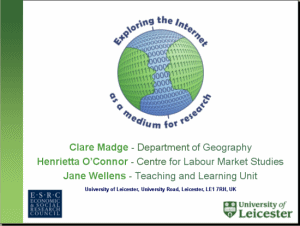
The first slide of the presentation
Evaluation questionnaires were distributed during this presentation with the aim of taking a snapshot of the level of experience in using online research methods and training needs
While there was some experience of using questionnaires and asynchronous interviews, there seemed to be less experience of synchronous interviews and virtual observation. Those who completed the questionnaires expressed an interest in developing their knowledge of a wide range of issues such as:
The ethics of online research;
Computer software packages and technical issues for online research;
Sampling issues;
Facilitating online communication.
Comments suggested a general interest in the use of online methods, combined with awareness of risk, and concern over ethical issues and the perceived complexity of the area.
The presentation slides
(ppt, 750 KB) and the two-page
outline (pdf, 30 KB) written for the festival are available
for download, as is the full
document (pdf, 115 KB). (Requires Adobe Acrobat, ![]() link
to Adobe Reader). These documents will open in a new window
which you should close to return to this page.
link
to Adobe Reader). These documents will open in a new window
which you should close to return to this page.
 Session 2: Qualitative data at your fingertips
Session 2: Qualitative data at your fingertips
Chris Mann delivering her presentation
Chris Mann (Oxford Internet Institute)
Chris Mann's discussion brought out issues very much at the heart of the dynamic between the exciting potentials of online research methods, and the challenges they can bring.
She focused on the issues involved in developing expertise as a qualitative researcher conducting asynchronous interviews, and in ensuring online research is conducted ethically.
She gave the following pointers for success as an asynchronous interviewer:
The researcher must balance 'technical expertise' with 'relational expertise';
The particular difficulties of 'connecting' online mean that the researcher has to work on establishing rapport with participants and developing interactive skills.
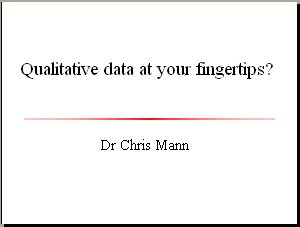
The first slide of the presentation
She went on to point out the following:
The appropriacy of well established ethics codes may be called into question when applied to online research, given its distinctive features.
The debate over ownership of what appears online, and over 'public' versus 'private' online 'spaces' is central.
There are a number of key technical, legal and personal risks attached specifically to online research that must be considered if researchers are to avoid causing harm through their online research activities.
Select the following links to view the presentation
slides (ppt, 208 KB) and the full outline
(pdf, 26 KB) of the talk in a new window. (Requires Adobe Acrobat,
![]() link
to Adobe Reader).
link
to Adobe Reader).
 Session 3: Virtual ethnography revisited
Session 3: Virtual ethnography revisited
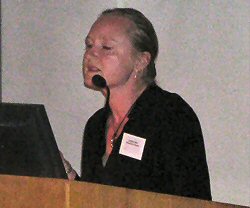
Christine Hine delivering her presentation
Christine Hine (University of Surrey)
Christine Hine's presentation centred around the need to find ways of taking seriously the things people do on the internet if we want to produce authoritative and well-rounded accounts of contemporary society.
She outlined ten principles for online ethography as follows:
- We can use ethnography to investigate the ways in which use of the internet becomes socially meaningful.
- Interactive media such as the internet can be understood as both culture and cultural artefact.
- The ethnography of mediated interaction often asks researchers to be mobile both virtually and physically.
- Instead of going to particular field sites, virtual ethnography follows field connections.
- Boundaries, especially between the 'virtual' and the 'real', are not to be taken-for-granted.
- Virtual ethnography is a process of intermittent engagement, rather than long term immersion.
- Virtual ethnography is necessarily partial. Our accounts can be based on strategic relevance to particular research questions rather than faithful representations of objective realities.
- Intensive engagement with mediated interaction adds an important reflexive dimension to ethnography.
- This is ethnography of, in and through the virtual – we learn about the internet by immersing ourselves in it and conducting our ethnography using it, as well as talking with people about it, watching them use it and seeing it manifest in other social settings.
- Virtual ethnography is, ultimately, an adaptive ethnography which sets out to suit itself to the conditions in which it finds itself.
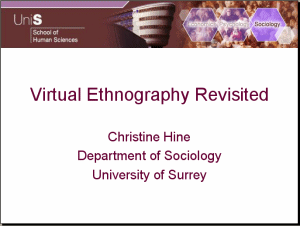
The first slide of the presentation
She then went on to outline a number of issues that emerged from her recent research exploring uses of information and communications technologies in scientific research, namely:
The importance of developing appropriate researcher presence online.
The limitations of covert ethnography and the fact that negotiating consent should not be seen simply as an ethical duty, but as an opportunity to enjoy an enhanced research experience.
The importance of participating in and understanding a communication ecology.
Select the following links to view the presentation
slides (ppt, 750 KB) and the session outline
(pdf, 22 KB) in a new window. (Requires Adobe Acrobat, ![]() link
to Adobe Reader).
link
to Adobe Reader).
 Open
forum debate
Open
forum debate
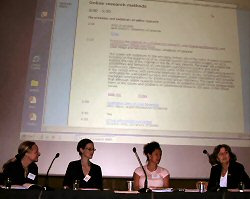
Answering questions from the floor
The main issues discussed in the open forum debate were as follows:
 Access and sampling
Access and sampling
Issue: It is difficult to reach financially and socially excluded groups through web-based research. The example of the 'Cyberparents' project which investigated the use of a web-site by new parents highlights this exclusion.
Response: Research such as this is useful and worthwhile as an investigation into a subset, but that it would be impossible to make generalisable claims, and wrong to attempt to do so.
Issue: It is difficult to establish a sampling frame for web-survey research.
Response: There are both technical and ethical difficulties in purposively identifying respondents. Where surveys are made openly available, it is also particularly difficult to reach target groups and establish what proportion of target groups are users of the internet.
 The validity of online
methods
/ ethical issues
The validity of online
methods
/ ethical issues
Issue: There is ongoing anxiety over the perceived validity of online methods.
Response: Triangulation is important, and there is a danger of attempting to divorce online methods from research methods in general. As a tool in a wider methodology, such methods can add a great deal of value.
Issue: Ethical issues were raised in discussion of the use of public message boards with reference to the 'public v. private space' debate.
Response: The importance of maintaining communication and offering a right to reply was stressed.
 Virtual ethnography /
Auto-ethnography versus autobiography
Virtual ethnography /
Auto-ethnography versus autobiography
Issue: An interesting discussion developed over the use of ethnography to investigate the way in which people interact with the internet and other emerging technologies, and indeed over the meaning of the term 'interactive'.
Response: There is a need for researchers to see people using new technology on site as part of an approach to understanding.
The panel also pointed out the importance of placing personal experience and reflection in a wider context in a process of auto-ethnography rather than biography. The social and collective nature of this process was highlighted as a distinguishing factor between the two genres.
 Technical matters
Technical matters
Issue: What software should be used for secure synchronous communication?
Response: The panel pointed out that part of the purpose of the Exploring Online Research Methods in a Virtual Training Environment project was to provide hands-on technical advice as well as offer resources and training materials on the theory and practice of online research.
 Further
information
Further
information
More information on the festival can be found at the Research Methods
Programme' ![]() Festival
page on its website. You can also find details of all the
Festival
page on its website. You can also find details of all the ![]() Other
sessions on the same site.
Other
sessions on the same site.
In 2006, 2008 and 2010, the second, third and fourth Research Methods Festivals were held at St
Catherine's College, Oxford. Information and and resources are available from the following links:
![]() Research
Methods Festival 2006;
Research
Methods Festival 2006; ![]() Research
Methods Festival 2008;
Research
Methods Festival 2008; ![]() Research
Methods Festival 2010.
Research
Methods Festival 2010.

